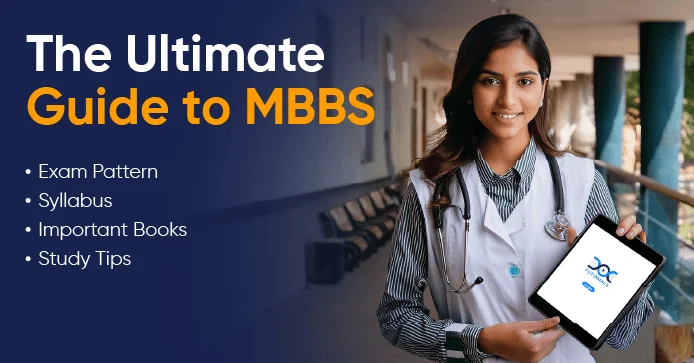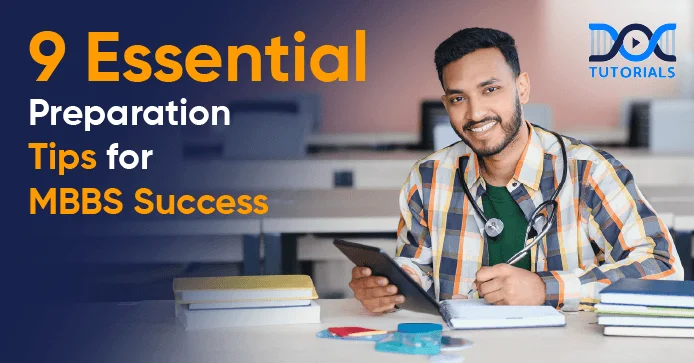
MBBS is a dream come true for many of the students like you. This journey involves commitment, excitement, stress, endless notes, and a vast MBBS syllabus. But it’s all part of becoming a compassionate and skilled doctor.
With our guide, you can navigate the MBBS journey, with practical tips and strategies to help you feel more confident.
Decoding the MBBS Exam Pattern
Understanding and preparing for the MBBS exam is one of the biggest challenges faced by many students like you. MBBS exams typically include MCQs, short-answer questions, and practical assessments. These exams are designed to test not only your theoretical knowledge but also your clinical skills—pushing you to bring out your best.
- MCQs are your ultimate test of rapid thinking and knowledge of high-yield topics. Practicing previous year’s papers is essential. The more you practice, the sharper your recall and understanding will become.
- Short-answer questions need concise & well-structured answers. They challenge your depth of understanding of all concepts. Regularly practice framing answers, ensuring you cover the key points.
- Practical assessments, including OSCEs (Objective Structured Clinical Examinations), evaluate your clinical skills. Make time to practice with your classmates or attend practical labs.
Understanding the MBBS exam pattern can help you structure your preparation plan. Make a checklist of important topics of each subject and cover them systematically and thoroughly.
“Remember, you’ve got what it takes—one topic, one step, and one success at a time. Keep pushing forward; your future as a doctor is within reach.” – A leading MBBS faculty at DocTutorials.
MBBS Syllabus: What Every Student Needs to Know
The MBBS syllabus is vast, covering a wide range of simple & complex topics from various subjects like Anatomy, Physiology, Biochemistry, Pathology, Pharmacology, and Microbiology. Each MBBS subject is as important as the other, collectively building the foundation for all medical knowledge.
1. First Year: Building the Basics
- Anatomy
Mastering the structure and functions of the human body requires detailed memorization and visualization.
- Physiology
Focuses on how the body works, from organ systems to cellular processes.
- Biochemistry
Delves into the chemical processes like metabolism and enzymatic reactions.
2. Second Year: Understanding Diseases and Treatments
- Pathology
Learn about disease mechanisms and how they impact the body.
- Microbiology
Discover the fascinating world of microorganisms, including bacteria, viruses, and fungi.
- Pharmacology
Gain insights into how medicines work, their effects, and their applications in treatment.
MBBS second year builds the basics for you, transitioning you from understanding the normal body to identifying and managing its abnormalities.
Clinical Years: Bridging Theory and Practice
During the clinical years, the focus shifts to patient care, diagnostic techniques, and treatment methods. Medicine, Surgery, Pediatrics, and Obstetrics & Gynecology subjects integrate theoretical knowledge with hands-on skills, preparing you for real-life medical challenges.
It is best to have a realistic study plan to manage the MBBS syllabus. Prioritize your understanding of topics & concepts over memorization. The best to do is to allocate focused time on each subject.
Must-Have MBBS Books for Each Subject
With the right MBBS books, you can master the MBBS syllabus by grasping complex topics easily. Here’s a list of essential books for core subjects.
- Anatomy: B.D. Chaurasia’s “Human Anatomy” is a classic that simplifies the vast scope of Anatomy with clear diagrams and explanations.
- Physiology: Guyton and Hall’s “Textbook of Medical Physiology” breaks down concepts in a logical way, making difficult topics easier to understand.
- Pharmacology: K.D. Tripathi’s “Essentials of Medical Pharmacology” is well-regarded for its practical approach, covering drugs, mechanisms, and side effects comprehensively.
- Pathology: Robbins & Cotran’s “Pathologic Basis of Disease” is a go-to for pathology, covering disease mechanisms in detail with plenty of illustrative figures.
Remember, too many reference materials can feel overwhelming, so choose one primary textbook per subject.
In addition to textbooks, platforms like DocTutorials offer expertly curated video lectures for all 19 MBBS subjects. With 3D animated videos, complex topics are simplified with visuals that aid better understanding and retention. Also, our top faculty breaks down subjects into crisp, concise & clear video lectures for effective learning.
“The right resource like DocTutorials can turn confusion into clarity and help you succeed every step of the way.” – MBBS students’ most favourite faculty.
Study Tips to Master MBBS Subjects and Excel in Exams
Managing the workload and stress to perform the best in your MBBS journey is overwhelming. But with the right strategies, you can excel in your MBBS exams.
- Create a Study Schedule
A well-organized study plan is crucial, so set weekly goals and dedicate your time to theory and practical sessions. Take breaks for a small interval of time so that you can avoid being burned out and stay focused.
- Active Recall
Test yourself on what you’ve learned. This technique will enhance your retention of topics and reinforce your understanding.
- Use Mnemonics and Visualization
There is a need to memorize a long list of facts and complex processes. For the same, you can use mnemonics or create visual tools like mind maps. These methods help you simplify information and make it easier for you to recall all important topics.
- Join Study Groups
Studying with peers or friends can provide fresh perspectives and insights that fill knowledge gaps, and boost motivation. Engage in group discussions for better retention and to reinforce your understanding of complex topics.
- Practice, Practice, Practice
Dedicate time to labs and practicals to get hands-on experience, which is essential for practical assessments.
Aim to understand each topic deeply, as this knowledge will be essential not only for exams but also in your future career.
Embrace Your MBBS Journey
MBBS is more than academics. It is a transformative journey of determination, growth, resilience, and purpose. Every sacrifice, sleepless night, and challenge brings you closer to your dream of becoming a doctor. Celebrate each victory, big or small, as a testament to your dedication.
“Keep believing in yourself, and know that every step is worth it. Trust in yourself, and never lose sight of your dreams. We are here to support you.” – Dr. Adit Desai
Latest Blogs
-

9 Essential MBBS Preparation Tips for Success
Achieving the dream of becoming a doctor is not easy. You need to be determined and have the right mindset…
 Back
Back


